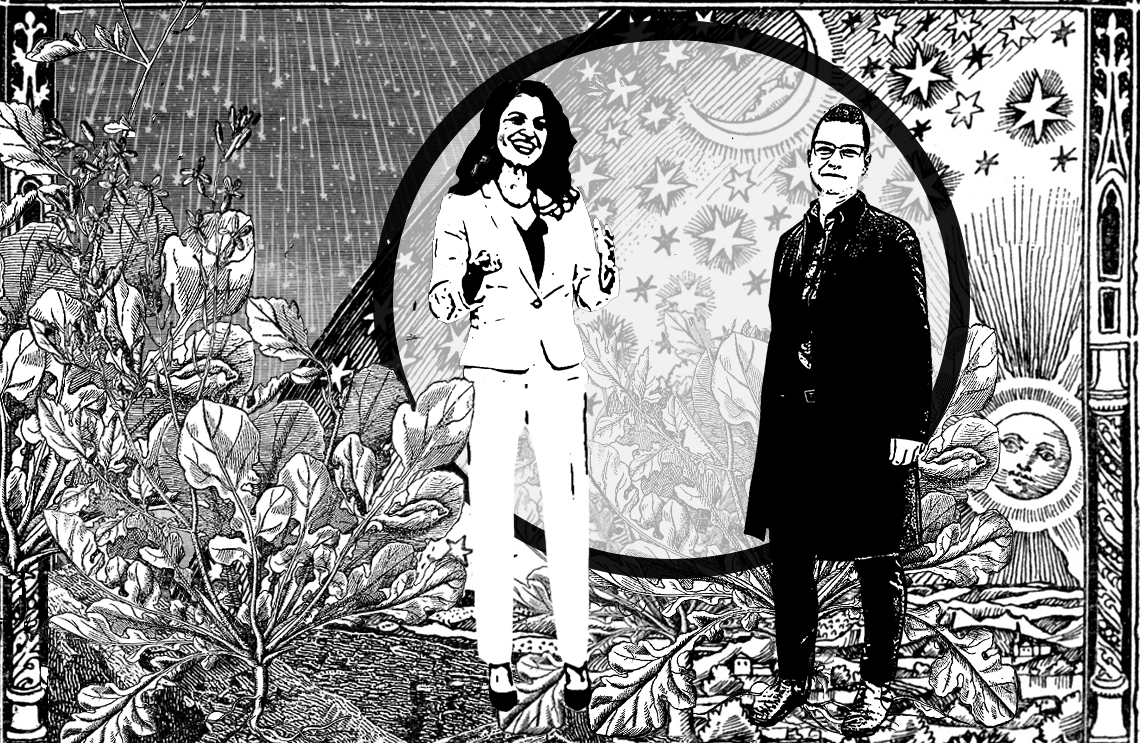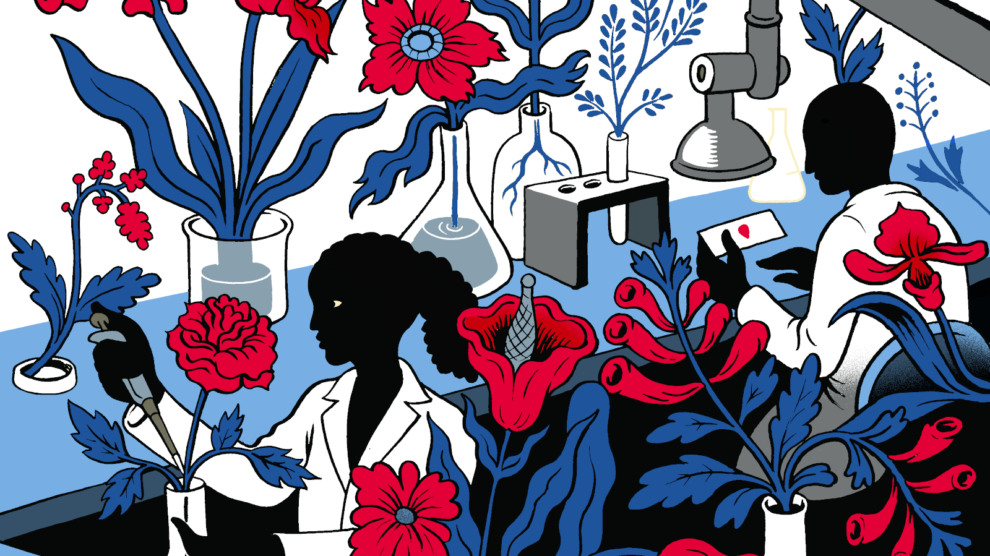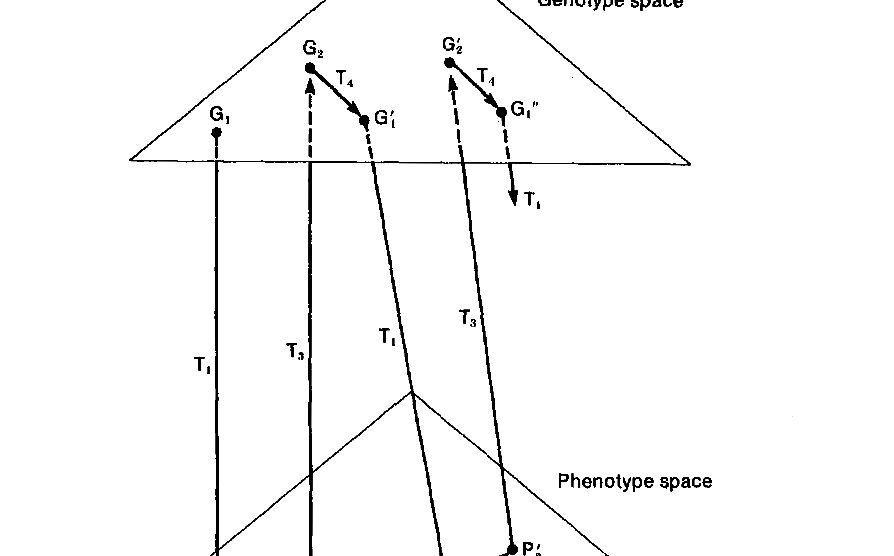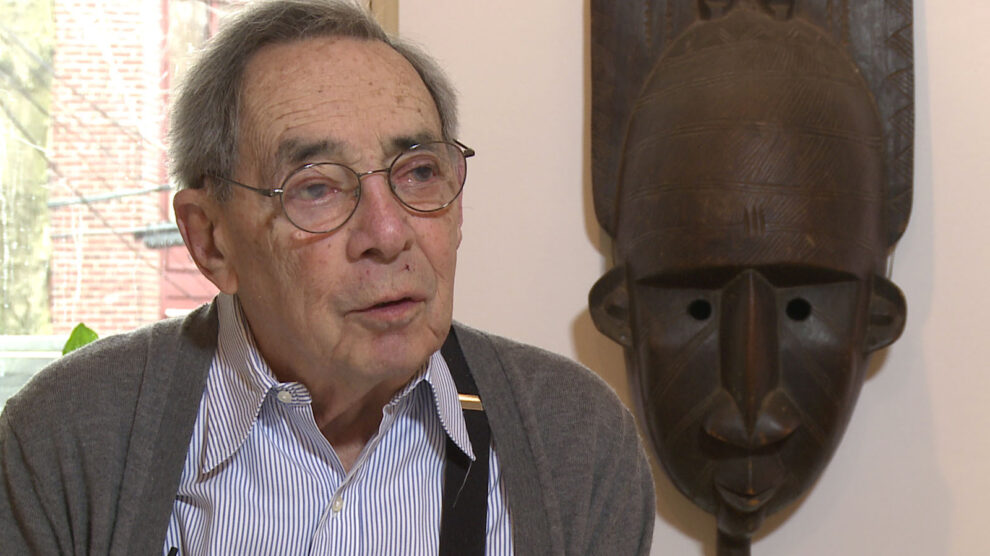Strong Animals: Humility in Science
By Rochelle Gutiérrez and Max Liboiron
Volume 22, number 2, Envisioning and Enacting the Science We Need

Science for the People is proud to introduce our two inaugural Circle Holders, Rochelle Gutiérrez and Max Liboiron. Circle Holder is an honor granted to individuals and groups whose work at the intersection of power, ideology, and equity in science is paving the way for diverse and just scientific futures. Circle Holder awards reward those whose actions and practices are impacting how science is done and used. Carefulness, ethics, accountability, and good relations are prioritized in selection alongside exceptional content and action. Circle Holders are appointed for life, and are responsible for recruiting, mentoring, and apprenticing future SftP Circle Holders with the end goal of creating a robust network of radical scientists across generations, disciplines, and nations.
An excerpt of this conversation appears in the print version of this issue.
Strong animals take rest
RG: We have to traverse so many fields to do the work that is in conversation, first with sanctioned versions of mathematics or science, and then keep abreast of a whole other set of literatures and ways we view the world and how we exist and how we come to know things. It’s a lot of work where one foot is in one world and another foot is in another. We have to be nepantlerx. It sometimes feels overwhelming to try to keep up with it all, but it’s also exciting and there’s a sense of honor.
I think of the metaphor of el burro in México. There is a lot of slang that suggests that word refers to being an idiot and other things. But I was raised to know el burro is a really strong animal that carries the load others cannot handle. And there’s a sense that womxn have, in many ways, been “la burra” because we carry the weight of our people and we do it with pride, walking softly on the land. It’s both this honor and burden.
In carrying the weight, though, I often feel like I’m not doing enough. I guess that’s one of the things I appreciate about you creating the protocols because those travel! That’s one less thing that I have to create.
In Lak’ech & Taanisi
RG: In Lak’ech. Rochelle Gutiérrez. Chicana. Soy la hija de Rubén Gutiérrez y Josefa Pérez de Aguascalientes y Chihuahua, México. Greetings, I’m Rochelle Gutiérrez, Chicana. My Rarámuri ancestors are from the Copper Canyon region of México. I currently work at the University of Illinois in Urbana Champaign where I’ve lived for twenty-three years. I do work around theorizing and trying to practice mathematics and mathematics education in ways that disrupt oppressions against people who are Indigenous, Black, Latinx, undocumented, dis/abled, and other historically oppressed communities.
ML: Taanisi. Max Liboiron dishinihkaashoon. Lac la biche, Treaty sis, d’ooshchiin. Métis naasyoon, niiya ni: nutr faamii Woodman, Turner, pi Umperville. Hi, my name is Max Liboiron. I’m Michif and settler from Lac la biche, Alberta, Canada. My godfather, Rick Chavolla (Kumeyaay), is from not too far from where your family is from, Rochelle! I’m an environmental scientist and specialize in marine plastics. The main project I’m involved in is building feminist and anti-colonial scientific protocols in environmental science through my lab, Civic Laboratory for Environmental Action Research (CLEAR).
ML: I think that’s central to the practice that our lab does—make places for others to stand, share things that might lighten the load. Like you say, our interdisciplinary work is not only difficult because you have to be an expert in more than one field, but it’s also really politically heavy. Your mathematics have to be legible as “mainstream mathematics” while also trying to change that field, which always ends up reproducing some of the field you think should be changed! That’s heavy! Especially when you’re also accountable to those spaces and terrains with compromised politics. That’s not only heavy, it’s fucking hard.
I’ve met folks who have expressed feeling guilt about being in a compromised system, where they end up reproducing part of the system they’re trying to change (which is the condition for activism), or about being incapable of doing everything that needs to be done as if they could be a social movement by themselves. I’m fortunate to have an Elder, Rick, where one of his main teachings is to stop. To let things fall down, and to get back to it later, throughout life. You’re still a good relative when you’re stopped. With his support, I’ve come to a place where I don’t feel guilty about not doing enough because I know it’s my job to stop sometimes. It’s the condition for going forward, later.
RG: Thank you for that for that offering because I needed to hear that. My work is ultimately about transforming society. I want to change systems. And, having grown up in a Chicanx activist family dedicated to campesinos (farmworkers) and people who are undocumented, I know the work is not about the person anyhow. It’s about the movement. If everything is so dependent on the person, then your movement is screwed. That’s all they have to do is take the person out.
ML: Yes, it’s a precarious model of social change if assassination can undo it!
Living Mathmatx
RG: One of the pieces I have been pushing on is how to make our practices, both in school and in society, more humane for all of our relatives. People often presume the mathematics that we currently operate from is one mathematics and it’s the only mathematics that we can have and that the world will stop advancing if we somehow stop protecting it. In 2002, I wrote this article that offered a three-part definition to equity, which is a word that’s used a lot in our field.1 One part related to what I call “playing the game,” which is addressing access and achievement for people that factors into credentialing and sanctioned mathematics. Another part is about “changing the game,” which is changing who is viewed as good at mathematics—who is mathematics by and for—as well as mathematics as a critical lens to view the world and attend to problems in our community, those kinds of things. But the third part was a new relationship between humans, mathematics, and the planet. And, at the time, I didn’t fully know what I meant by that, other than that the mathematics that are acknowledged and affirmed today are incomplete and oppressive. So, to say we want more brown and Black and Indigenous bodies doing this thing that I feel is already incomplete and oppressive is not getting at it. Judging ourselves by the very forms of violence that we’ve historically endured and now we have more of our people doing it, that is not what I want for us. But when people would say, well, what’s this other form of mathematics you’re talking about?, I didn’t really have a complete version. It’s taken me fifteen years to put down on paper something I would be happy with.
ML: So what’s an example of how you do math in good relation with relatives?
RG: I guess one of the ways is to start with the recognition that we are the younger brothers and sisters in this world. Our plant and animal relatives have been living a form of mathematics for millennia: seeking, acknowledging and creating patterns for problem solving and joy. They have worked out ways of being that have helped them (and us) resist and survive. So, I talk about “living mathematx,” which calls for an ontological shift.2 Whereas mathematics is often viewed as a noun, a thing we discover or invent, or a practice, a tool humans use to model and then control or dominate the world, mathematx is a way of being. It’s not universal, it’s place-based because it reflects relations. Mathematx seeks to address that erasure, to acknowledge the ongoing dispossession that happens through (eurocentric) mathematics.
Living mathematx begins with the premise that we are all in relation, that we have a responsibility towards each other, and that there are always multiple interpretations of reality that make things uncertain (nepantla).3 What has been important for me is an ecology of knowings, rather than a single dominating way of knowing. The fact that mathematx begins with relations, what Simpson refers to as “deep reciprocal, consensual attachment” is important because our colonizers have focused on breaking our intimate connection with each other and with land because it’s how we renew ourselves.4
I think of the Mayan concept of In Lak’ech that I was raised on. In Lak’ech is both a greeting and a way of acknowledging that we are all related, that “you are another version of me and I’m another version of you.” So, if I do harm to you, I harm myself. In thinking about how we’re in relation to each other, I think of plants and what they have to teach us, how they live mathematx. Now, a lot of people will say, “Oh, yeah, nature, there’s mathematics in nature.” But, what they mean is there are eurocentric mathematical patterns that are already known and sanctioned and we can find those in plants and landscapes, for example. But, the version they mean is a stripped down universal pattern that is a form of representation, not a pattern that is honoring living beings in deep reciprocal relationship, a form of intervention in the current world. So, they acknowledge fractal patterns in tree branchings, ocean shorelines, and snowflakes. They look at plants and note that their leaves are spread out in “Fibonacci sequences.”5 But, they aren’t really concerned with the relationships between plants.
I think of las tres hermanas (the three sisters), which are beans, corn, and squash, an important dish in my family. And these sisters have a relationship that goes far beyond leaf placement or what is normally referred to as phyllotaxis, or the Golden ratio.6 They share space and sunlight; they offer nutrients to each other (the corn provides the structure for the beans to grow; the squash provides coverage for the roots; the beans turn atmospheric nitrogen into mineral nitrogen shared in the earth); and they live in harmony.

I’ve been trying to expand what we think of ethnomathematics. Mathematx as a way of seeking, acknowledging, and creating patterns for problem-solving and joy makes room for place-based ways of knowing and being, for ceremony, for interrogation of heteropatriarchy, for sovereignty, and metaphysics, among other things. Living mathematx, for me, is a generative politics of refusal of a eurocentric mathematics. But, I’ve been going on for a while. I actually want to know more about your work.
Universalism versus humility
ML: I think we have a lot of parallels and overlaps even if we’re coming from different places. When you were talking about mathematx, I was thinking a lot about the struggles that we have in science with universalism. Universalism can be understood as an aggressive form of European self-portraiture, the understanding that things everywhere are the same with a few variations.7 But this is a specific cultural understanding that only comes from one worldview. Saying that the world is best understood through one worldview, or worse, saying you’re “objective” and that you don’t have a worldview, aggressively erases all other ways of being and doing in the world. Dominant science does that all the time.
The violence of universalism really hit home when I came to the island of Newfoundland to do some plastic research. I went to the shoreline to do the universal shoreline protocol, which involves scooping and sieving sand. But here it’s all rocks—big rocks, covered in ice and snow up to ten months of the year. No scooping or sieving! I thought, “Shit I can’t do plastic research here! I can’t compare it to any other paper that’s ever been published on plastics on shorelines, ever!” I did some research and I found out that other scientists know this too, and they just avoid rocky areas so they’ll have a rocky shore and find the one little patch of sand and do plastic monitoring there.8 So you turn diverse landscapes into “universal” ones, erasing place.

The lesson that universalism can’t see everything is a lesson I’ve taken to heart in the lab, and we’ve been developing place-based scientific protocols since. This process takes humility very seriously, which I think is part of, it’s another name for what you were talking about.
Humility is different than modesty. Modesty is this understanding that, like, you don’t talk about how great you are because it means other people are less great or you don’t want to bring attention to yourself. But humility is bringing attention to how there’s no such thing as an individual accomplishment—you’ve only accomplished something because of your web of relations, from family to janitors to infrastructure and beyond. Being modest means erasing those relations. Humility means bringing them to the front.
In CLEAR, this means for example that we aren’t studying other people’s food webs, we’re studying our food webs. Plastics aren’t some separate thing we’re studying—they’re the things that keep us alive, that are in our bodies like contact lenses and fillings and pacemakers. Intimate things. Life-giving things. Also harmful things. Just like other kin. Yes, sometimes they are bad relations and have to be treated accordingly. But they’re still family. It’s the same big question whether you’re a scientist or not: what do you do with your asshole pedophile uncle who’s still family? You do not let him in the house. But you don’t eradicate him, even if you shun or ostracize him. Environmental campaigns based on eradication and purity aren’t humble.
You’ve talked about a couple of concepts that come out of the languages and the concepts you’ve grown up with and I’ve been thinking a lot about payhtuk or papaychii. I learned the word when I was teaching my dogs Michif and I wanted to ask them not to pull on the leash. A lot of Anglo-English translations translate it as careful, as in “be careful, there’s danger.” But if you look at Michif or Cree translations, it means “mind your bundle and walk with care because the way you walk is good or bad medicine for other people.” It’s not about danger. It’s about humility, essentially. And so that’s sort of part of what we’ve been trying to figure out in our scientific protocols. How do you be or do or act payhtuk in the lab? How do you do statistics data carefully, knowing that the way you lay down your numbers have effects, are medicine?
Political clarity
RG: Sometimes I get pushback about living mathematx and people want to know what that looks like in classrooms or schools. For me, that’s missing the point. Once we’re in schools in a settler colonial society, once we’ve divided bodies up into particular aged kids in a room and we have assessments that are based upon standards, I just can’t imagine it happening. Schools do not offer students self-determination or respect mental sovereignty. So, I try to distinguish between what I refer to as (1) “rehumanizing mathematics,” which has many of the underlying principles like In Lak’ech and does the best it can within the constraints of schooling as an institution, and (2) living mathematx, which I believe needs to happen in intergenerational communities outside of schools.9
Some people hear my work on mathematx and are excited to want to do it in schools and get mad when I say I don’t see it in schools. They think I’m back-peddling on my goals. But, historically we know that it’s never worked that way. If we just look at when people have tried to do this work in universities, in school systems, even when Indigenous people have been in partnership or leadership, it ends up getting co-opted, limited, or is crushed in some way. So I don’t want to fool myself into thinking that that it can happen in those institutional spaces through some kind of incremental change. I would love for there to be more In Lak’ech, reciprocity, and nepantla in mathematics classrooms, but I don’t see how we will decenter humans or many of the other things I think are important. So, these two approaches work in parallel for me, similar to playing the game and changing the game. They’re in relation because we cannot simply give up on schools entirely.
ML: I think you’ve just said something extremely sophisticated and nuanced that I think people who do work like we do struggle with if they don’t have that nuance. A lot of the work we do is at the level of strategy and tactics, but that doesn’t necessarily scale up to system change. System change is something quite different. I think a lot of frustration people have is when they assume that tactics scale to system change, but they don’t—can’t!—do that.10
If you think about scale in terms of relationships that matter, it allows clarity that can help with theories of change. What matters at the scale of cells is osmosis, lipid barriers, little endocrine signals. What matters at the scale of arms is goose bumps, tattoos, skin colour. But you don’t put a bandage on a skin cell. You don’t chop an arm into lots of pieces and get cells. Things do not automatically scale, even if they are related. Theories of change need to have specific, concrete ideas of how things move from one scale to another. This is what I think you’re talking about. I think it’s ethical in terms of understanding methodologically what we can and cannot do in change work and activist STEM, and not reclaiming or overreaching.
Holding the circle and grifting
ML: I’m doing community-based plastic monitoring in Nunatsiavut with my research partner, Liz Pijogge. But there’s a trick to it—I feel that if we’re actually successful and Inuit people have sovereignty over their science, then the traditional European science model will fail. That’s hard to get science funding with! The goal of the work is to make myself obsolete as an outside scientist by making sure all the skills and talent and equipment (and grant money!) are left in the community. Then they don’t need me. They can still want to work with me, but they don’t need to work with me. At the same time, I’m offering them western scientific methods, which I hope they reject. Then they also won’t need me!
RG: So, what you’re saying to communities is, “I’m going to pull back the curtain and teach you the science that Western people practice. Then when other people come into your community and try to sell you with this bill of goods about how you will be so much better if you had these technologies or practices in your life, you will be able to say very articulately why they may not serve your needs.” That’s really important—that ability to deconstruct what others want to paint as “progress” or “advancement.”
I partly do that with teachers around the concept of creative insubordination. I show teachers how schools and corporate America try to define a “quality teacher” or “professional” as having these certain qualities and following the latest trends. For example, schools are sold packaged reforms like “individualized computer learning,” “growth mindset,” and “grit” as being the key to “equity.” Those sound good if you don’t know how to pull back the curtain and examine them for what you stand for as a teacher. And, most teacher education programs never prepare teachers for the politics they will face if they are going to be true advocates for Indigenous, Black, or Latinx students, which basically means being willing to rock the boat. Instead, there is all of this focus on content knowledge, pedagogical knowledge, and knowledge of students, which leads to a kind of methods fetish, as in, “learn this way of teaching and it will be the silver bullet.”11 I’m not trying to prepare teachers with how to do a particular practice, I’m simply helping them get more effective at understanding how the latest reforms may not be in the best interest of their students and how to stand up to the system, without getting fired, of course—that’s the creative part. And, in some ways, that means being prepared to stand up to anyone who might offer them “professional development,” including me. So, I guess I’m also in the business of becoming obsolete!
ML: Yes! There’s another kind of work that balances the line between working in the system and against it, and the model that I use to understand it is the grifter. A grifter is someone who knows the system really well, enough to pass in the system, but isn’t of that system. It’s not a coincidence that I’m a white coded (and white-coated!) person and I’ve become an expert in passing, being read differently by different parts of the system. We publish, we get grants, but we’re also funneling money to Land and making sure students who don’t meet eligible baseline grades are getting into grad school if they want. Neither of those things is the “real” work. A con artist I know says that the best love cons are the ones where you do fall in love. You’re living in two worlds, in two truths, with one face. In my case, I am an academic. I like it. I like publishing. But I’m also doing equity-based peer review, community peer review.12 I am also breaking publishing where I can. Grifting is stealing-back.
To be clear, I’m never compromised to the point where I’m not also enacting humility or what I think is best for Land. But these compromises are part of being within the screwed up structures that need to change. I think that what it is to be a professional and also a “radical” if we want to call it that, is to grift. That’s how you deal with the compromise. Starting from scratch, the fresh slate, terra nullius, is the colonizer’s dream—to act as if there was no Land there to begin with. This is ground you’re standing on, even if it’s fucked up ground. It’s ground with legacy. The question is, how do you maneuver that terrain, how do you grift, how do you compromise ethically?
RG: I love this metaphor of grifting. The metaphor I’ve used is “play the game/change the game.”14 I’m not choosing one or the other but choosing to live within that messy space. Part of my work as an academic is knowing enough about the game to not be completely discounted because my ulterior motive is to change the game. For example, in publishing, it’s recognizing that the power of putting things down in writing is that it’s there forever, for people to find and to be able to stand on. In graduate school, a professor tried to silence me because I didn’t agree with his interpretation of the text…until I was able to find and show him something published in a journal that supported my view. So, when I write, I am constantly thinking not just about what I want to say, but remembering that words can keep someone from being erased. I fight for particular terms and framings because once they are out there, they become part of the discipline. When I’ve edited special issues of journals, I’ve required all of the authors to position themselves in the work, to say how their identities and ideological perspectives impacted their research design, engagement with participants, and findings because it shows that there is no such thing as apolitical or culture-free mathematics.
ML: I know we agree with how important setting precedents is! They make other worlds possible. We were saying history denaturalizes the present by showing us how other worlds have existed, and precedents are for making diverse futures more likely, more normal. Two temporal strategies for change!
Radical Science?
ML: So… We’re Science for the People Circle Holders, and SftP is a home of radical science. Um, what do we mean when we say radical or when we fly under this banner of radical science? I use the terms feminist and anti-colonial to describe my science, but don’t use the term “radical” in my world.
Sometimes I think radical means “outside” or out on the edge of something. But the point of a lot of what we do is reclaiming forgotten areas of how science and maths have been done before they were dominated by European Enlightenment styles of STEM. And we’re trying to make those normal again, make sense again. At the same time, we’re not outside of power structures of those European sciences and ways of knowing. We both have doctorates. White coats, so to say.
I think our knowledge practices are implicated in it in very complex ways and that is a struggle we’re accountable to. I feel like that’s what we can mean by radical. Not like I’m pushing this boundary until it pops without accountability, but that we are deeply accountable to many, many places, including the fucked up nature of the ground we stand on. That’s what radical might mean in our context—a split, deep, complex accountability.
RG: I love that. It goes back to holding yourself accountable or reliable to others. It’s a constant vigilance, a moving thing, revising the work. It’s saying that while we’re doing the work, we’re strategically insubordinate. We’re reflecting on how we’re being taken up by and affecting other people.
So radical is not a noun. You don’t get to achieve the radical science and math checkbox. As if its constant or can be done. It’s a state and it’s not something you claim for yourself—it’s something that’s recognized by the relations that you’re part of.
ML: Yeah. There we go. Easy peasy lemon squeezy radical definition.
RG: I wish all of my exchanges about science and math were this joyful and exciting!
ML: We’re also good-looking. Don’t forget about that. Some people might miss that because of our minds.
About the Authors
Dr. Rochelle Gutiérrez is Professor of Curriculum and Instruction at the University of Illinois at Urbana-Champaign. Her research interrogates the unearned privilege that mathematics holds in society and the roles that race, class, language, and gender play in teaching and learning mathematics (K-12 and university). She plays a leading role in the work of rehumanizing mathematics, understanding the political nature of mathematics and teaching, developing tools and supporting teachers to use creative insubordination, and considering new relationships between living beings, mathematics, and the planet.
Dr. Max Liboiron is the Associate Vice President (Indigenous Research) and Assistant Professor in Geography at Memorial University, where she directs the Civic Laboratory for Environmental Action Research (CLEAR). CLEAR develops feminist and anti-colonial methodologies and instruments in the natural sciences to study marine plastic pollution. Dr. Liboiron has played leading roles in the establishment of the field of Discard Studies (the social study of waste and wasting) and the Global Open Science Hardware (GOSH) movement, and is a figure in feminist science studies and justice-oriented citizen science.
References
- Rochelle Gutiérrez, “Enabling the practice of mathematics teachers in context: Towards a new equity research agenda,” Mathematical Thinking and Learning 4, nos. 2 & 3 (2002): 145-187.
- Rochelle Gutiérrez, “Living mathematx: Towards a vision for the future,” Philosophy of Mathematics Education Journal, 32, no. 1 (2017): 1-34. Available at http://socialsciences.exeter.ac.uk/education/research/centres/stem/publications/pmej/pome32/index.html.
- Gloria Evangelina Anzaldúa and AnaLouise Keating, this bridge we call home: Radical visions for transformation (New York: Routledge, 2002).
- Leanne Betasamosake Simpson, As We Have Always Done: Indigenous Freedom Through Radical Resistance (Minneapolis: University of Minnesota Press, 2017).
- I place Fibonacci in quotes to highlight the presence of settler colonialism. That is, although the Italian Leonardo Pisano (Fibonacci) receives credit for the pattern, many cultures and persons throughout the world, including Pingala in 200 BCE in India, had already known/performed the same pattern many years earlier. In fact, if humans are no longer the center, we might credit nautilus pompilius (Nautilus shell), pinus coulteri (pinecone), or helianthus annus (sunflower) with the “discovery.”
- Robin W. Kimmerer, Braiding Sweetgrass: Indigenous Wisdom, Scientific Knowledge and the Teachings of Plants (Minneapolis: Milkweed) 2015.
- Lorraine Daston, Lorraine, “The History of Science as European Self-Portraiture,” European Review 14, no. 4 (October 2006): 523-536.
- Shout out to Jessica Melvin, alumni of CLEAR, who is directing a plastic research group called PODs that creates special seasonal, place-based methods for sampling in Placentia Bay, Newfoundland, and Labrador.
- Rochelle Gutiérrez, “Why We Need to Rehumanize Mathematics,” eds. I. Goffney and R. Gutiérrez, Annual Perspectives in Mathematics Education: Rehumanizing Mathematics for Students Who Are Black, Indigenous, and Latinx (Reston, NJ: National Council of Teachers of Mathematics, 2018), 1-10.
- Max Liboiron, “Solutions to waste and the problem of scalar mismatches,” Discard Studies, February 10, 2014.
- Lilia Bartolomé, Beyond the Methods Fetish: Toward a Humanizing Pedagogy,” Harvard Educational Review 64, no. 2 (July 1994): 173-195.
- M. Liboiron, J. Ammendolia, K. Winsor, A. Zahara, H. Bradshaw, J. Melvin, C. Mather, N. Dawe, E. Wells, F. Liboiron, B. and Fürst, “Equity in Author Order: A Feminist Laboratory’s Approach,” Catalyst: Feminism, Theory, Technoscience 3, no. 2 (October 19, 2017); Max Liboiron, Alex Zahara, and Ignace Schoot, “Community Peer Review: A Method to Bring Consent and Self-Determination into the Sciences,” Preprints, June 2018.
- Rochelle Gutiérrez, “Framing equity: Helping students ‘play the game’ and ‘change the game’,” Teaching for Excellence and Equity in Mathematics 1, no. 1 (2009): 4-8. I have this image I use with two axes that intersect and at the center is nepantla. Nepantla is a Nahuatl word that means to straddle two diametrically opposed worlds or forms of existence. It’s based on Nahua metaphysics so it’s both the liminal space of this dual existence (like night and day together, or neither and both at the same time) and an active grappling with those multiple forms of reality. Unlike cognitive dissonance that is popular in whitestream society, where the goal is to choose between the two opposing options, Chicana feminists talk about the power to birth new realities by staying within the tensions.13Anzaldúa and Keating, this bridge we call home.





